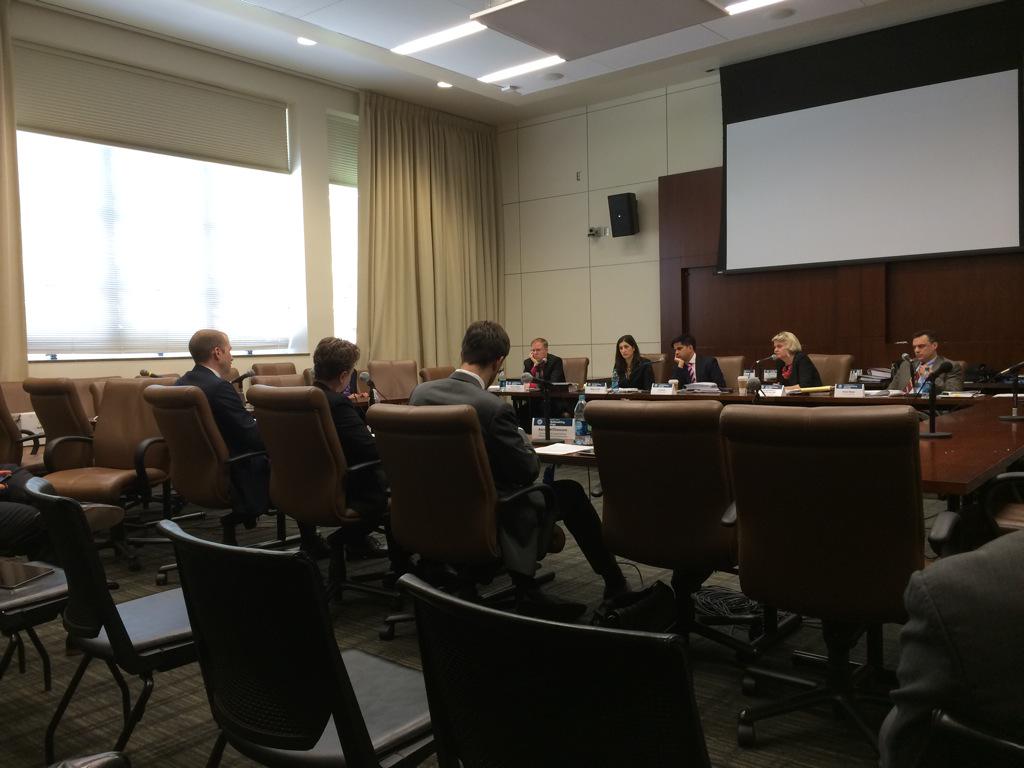Aaron Williamson Testifies on Conservancy's Behalf to Extend DMCA Exemptions to Smart TVs
May 21, 2015
Aaron Williamson, partner at Tor Ekeland, P.C. and pro bono counsel to Software Freedom Conservancy, participated this week at public hearings in Los Angeles with the Copyright Office. Williamson represented Conservancy, testifying in favor of a DMCA exemption for Smart TVs. Tor Ekeland prepared Conservancy's comments and responses in the Copyright Office's rulemaking process. This process is undertaken every three years to consider whether exemptions should be granted to the DMCA's restrictions on circumventing technical protection measures and DRM in copyrighted works. This is the first triennial review that Conservancy has participated in.

Aaron Williamson with Cathy Gellis (who also testified in favor of the exemption) and Matt Williams (who represented the MPAA, RIAA, and ESA, or the "Joint Creators"), across from the Copyright Office's representatives. The picture was taken by Jay Freeman (saurik), also participating in the DMCA exemption process.
In his testimony, Williamson pointed out the similarities between Conservancy's request and other jailbreaking requests, including the one granted in 2009 and 2012 for smartphones. The smartphone jailbreaking exemption granted in 2009 was renewed in 2012 because the Copyright Office had seen no evidence over the preceding three years that it had caused any adverse affects. Rather, both the vendor-approved and non-vendor-approved markets for applications have thrived. Williamson argued that the same effect could be expected in the Smart TV market.
In response to the Copyright Office's concerns with the question of whether circumventing firmware encryption and administrative access controls would enable piracy, Williamson stated that the applications of streaming services like Netflix, Amazon, and Hulu implement their own encryption for streaming content, and that they all make their services available on unlocked devices, specifically home computers.
When the Joint Creators' lawyer repeated the argument from their comments that circumventing the access controls would allow TV owners to install "illegal applications" like Popcorn Time, which allows users to easily discover, download, and display infringing content, Williamson echoed the points from the Exploiteers' supporting comments that because TVs don't have internal disks, using this type of application would require attaching external storage to the TV, which is no more convenient than hooking up their laptops where they can install Popcorn Time without cross-compiling it for the TV architecture.
Conservancy thanks Williamson and Tor Ekeland for their excellent work representing Conservancy and we look forward to the next stage of the DMCA exemption process.
Conservancy's Executive Director, Karen Sandler, is also participating in a coalition of medical device researchers seeking a DMCA exemption in relation to medical devices. The public hearing relating to that exemption request will place next week in Washington DC, where Andy Sellars of the Cyberlaw Clinic and Benjamin West will testify. We expect that the full transcript of all of the hearings will be made available on the Copyright Office's website.
